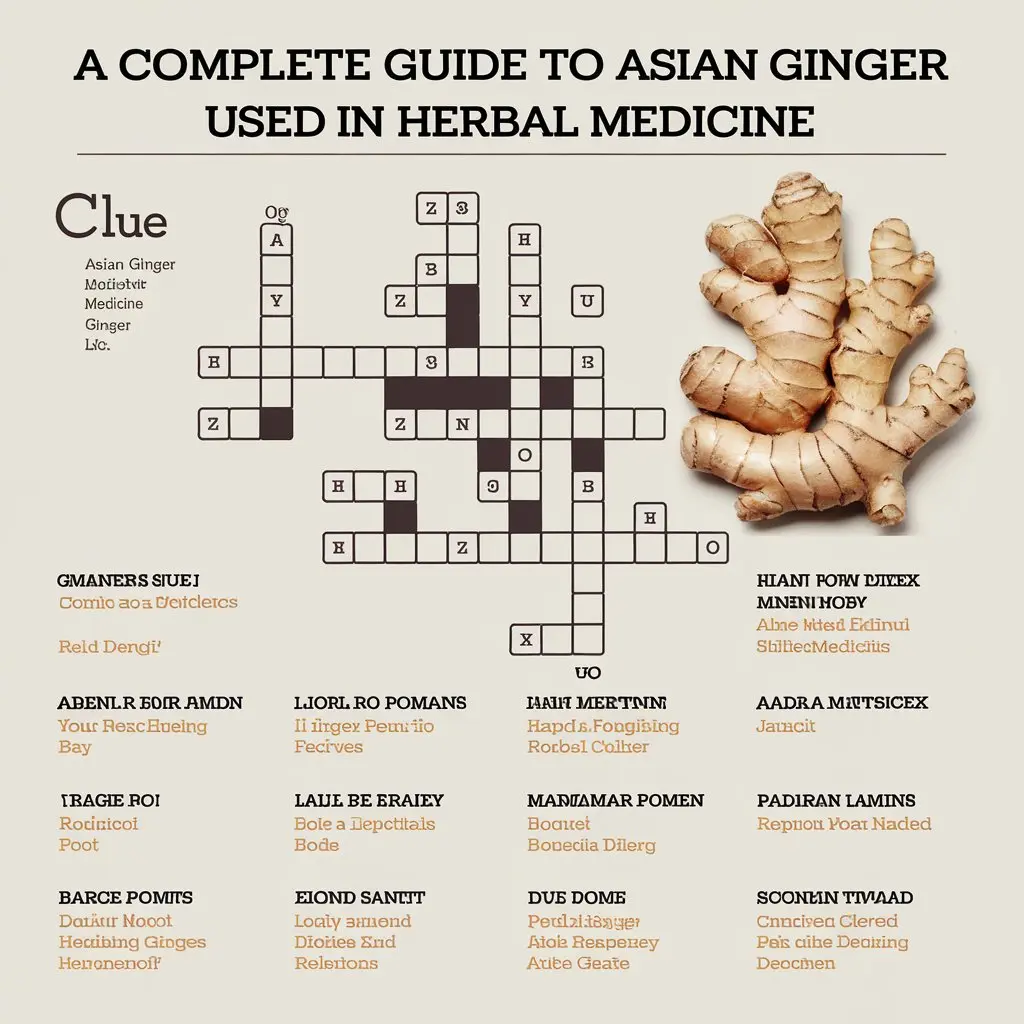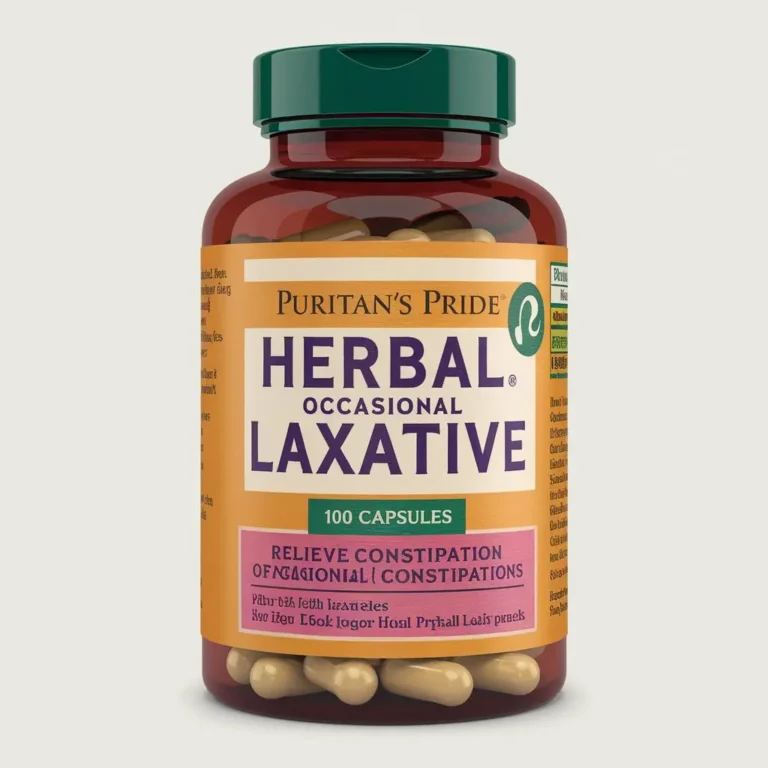Asian Ginger Used in Herbal Medicine Crossword: A Guide to Its Benefits
Asian ginger, a spice rooted in ancient traditions, offers much more than a flavor boost. Over centuries, it has been a go-to remedy in herbal medicine, serving as a natural healer for various ailments. In this article, we explore the numerous benefits of Asian ginger and why it holds a special place in the world of traditional healing.
What is Asian Ginger?
Asian ginger, also known as Zingiber officinale, is a flowering plant whose root is widely used in herbal medicine. Its spicy and warm flavor makes it a common ingredient in cooking, but its medicinal value is even more significant. Many cultures, particularly in Asia, rely on ginger to treat various conditions, ranging from nausea to inflammation.
Ginger’s History in Herbal Medicine
Ginger’s medicinal use dates back over 5,000 years, particularly in ancient Chinese and Indian cultures. Healers recognized its power to balance the body’s energy and soothe various ailments. Today, modern research backs many of these traditional claims, proving ginger’s potential in both preventing and treating diseases.
Boosts Digestive Health
One of ginger’s most well-known benefits is its ability to improve digestion. People often use it to treat nausea, indigestion, and bloating. It stimulates saliva, bile, and gastric juices, helping to break down food in the stomach. Additionally, ginger can prevent the discomfort that follows a heavy meal.
Helps with Nausea and Vomiting
Ginger is particularly effective in relieving nausea, whether from motion sickness, morning sickness, or chemotherapy. Many people find that ginger tea or ginger capsules calm their stomach during these experiences. Studies confirm its effectiveness, especially for pregnant women who prefer natural remedies for morning sickness.
Relieves Bloating and Gas
Bloating and gas often result from poor digestion. Asian ginger helps reduce these symptoms by speeding up the digestive process. It relaxes the muscles in the intestines, allowing gas to pass more easily. For centuries, people have turned to ginger tea after meals to avoid uncomfortable bloating.
Fights Inflammation
Inflammation is the body’s natural response to injury or infection. However, chronic inflammation can lead to serious health problems, like arthritis and heart disease. Ginger contains gingerol, a powerful anti-inflammatory compound. This makes it useful in managing inflammation-related conditions.
Reduces Arthritis Pain
Arthritis is a common issue, especially among older adults. The inflammation in the joints can cause stiffness and pain. Many people use ginger to relieve these symptoms. Ginger supplements or topical ginger oils may help reduce arthritis pain and improve mobility over time.
Improves Heart Health
Inflammation also plays a role in heart disease, the leading cause of death worldwide. Asian ginger may lower blood pressure and cholesterol levels, reducing the risk of heart disease. Its anti-inflammatory effects can protect the heart by improving circulation and preventing blood clots.
Enhances Immune Function
The immune system works to defend the body against infections and illnesses. Ginger strengthens the immune system, thanks to its antiviral, antibacterial, and antifungal properties. Regular consumption of ginger helps the body fight off common colds, the flu, and other infections.
Fights Cold and Flu Symptoms
Ginger is a popular home remedy for colds and flu. Its warming properties help clear up congestion and soothe a sore throat. Drinking ginger tea during the onset of a cold can shorten its duration. Ginger’s antioxidants also boost the immune system, helping the body fight off infections faster.
Speeds Up Recovery
When you’re sick, the body needs extra support to recover. Ginger can help speed up recovery by reducing inflammation and boosting circulation. The increased blood flow helps deliver oxygen and nutrients to tissues, promoting healing. Adding ginger to your diet when you’re feeling under the weather can make a noticeable difference.
Supports Weight Loss
Many people are surprised to learn that ginger can aid in weight loss. Ginger’s thermogenic properties help boost metabolism, encouraging the body to burn more calories. Additionally, its ability to improve digestion can lead to better nutrient absorption, making you feel fuller for longer.
Controls Appetite
Ginger can naturally suppress your appetite, helping you control cravings and avoid overeating. Drinking ginger tea before meals may help you eat smaller portions, as it promotes feelings of fullness. This makes ginger a valuable tool for anyone looking to manage their weight.
Improves Fat Burning
Ginger also enhances fat-burning processes in the body. By boosting metabolism and increasing energy expenditure, it helps the body break down fat more efficiently. Combined with a healthy diet and exercise, ginger can support weight loss efforts.
Improves Brain Function
Inflammation and oxidative stress play a role in cognitive decline as we age. Ginger’s antioxidant and anti-inflammatory properties can help protect the brain from these effects. Regular ginger consumption may enhance memory, focus, and overall brain function.
Protects Against Neurodegenerative Diseases
Ginger has potential in preventing neurodegenerative diseases, such as Alzheimer’s and Parkinson’s. Studies show that ginger can protect neurons from oxidative damage, slowing the progression of these conditions. While more research is needed, ginger holds promise as a natural supplement for brain health.
Boosts Cognitive Performance
In addition to protecting the brain, ginger may improve cognitive performance. Some research suggests that ginger can enhance memory and reaction times, making it a valuable addition to your daily routine. Drinking ginger tea or adding ginger to meals can help keep your brain sharp and focused.
Supports Healthy Skin
Your skin reflects your overall health, and ginger can contribute to a glowing complexion. Its antioxidant properties help protect the skin from damage caused by free radicals. Ginger also promotes better blood circulation, which delivers more nutrients to the skin, keeping it healthy and youthful.
Treats Acne and Blemishes
Ginger’s antibacterial properties make it an effective natural remedy for acne and blemishes. Applying ginger topically can reduce redness and inflammation in the skin. It also helps kill the bacteria that cause breakouts, making your skin clearer over time.
Reduces Scars and Stretch Marks
Ginger’s ability to improve circulation can also help reduce the appearance of scars and stretch marks. Applying ginger oil or ginger-infused lotions to affected areas may promote healing and regeneration of the skin. Over time, this can lead to a more even skin tone and texture.
Boosts Respiratory Health
Ginger’s benefits extend to the respiratory system as well. Its anti-inflammatory and antioxidant properties help clear up respiratory issues, such as asthma and bronchitis. Ginger tea is often used to soothe coughs and clear mucus from the lungs.
Relieves Asthma Symptoms
Asthma is a chronic condition that inflames the airways, making it difficult to breathe. Ginger helps relax the muscles in the airways, improving airflow and reducing asthma symptoms. Drinking ginger tea regularly can support respiratory health and reduce the severity of asthma attacks.
Treats Respiratory Infections
Ginger’s antibacterial and antiviral properties make it effective in treating respiratory infections. It can help clear up chest congestion, relieve coughs, and soothe sore throats. Adding ginger to your diet when you’re experiencing a respiratory infection can speed up recovery.
How to Use Asian Ginger
You can enjoy the benefits of ginger in many ways. Fresh ginger root is the most common form, and you can easily add it to your diet by grating or slicing it into meals and teas. Ginger powder and capsules are also available for those who prefer a more convenient option.
Ginger Tea
One of the simplest ways to use ginger is by making tea. Slice a piece of fresh ginger root and steep it in boiling water for 10 minutes. You can add honey and lemon for flavor. Drinking ginger tea daily can offer many health benefits.
Ginger Supplements
If you’re not a fan of the taste, ginger supplements are another option. They come in capsule or powder form and offer concentrated doses of ginger’s active compounds. Always check with a healthcare provider before starting any new supplements.
Conclusion
Asian ginger, long celebrated in herbal medicine, offers a wide range of health benefits. From improving digestion and reducing inflammation to supporting weight loss and boosting brain function, ginger is a versatile and powerful natural remedy. By incorporating ginger into your daily routine, you can take advantage of its healing properties and improve your overall well-being.







